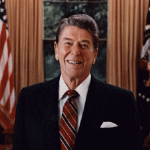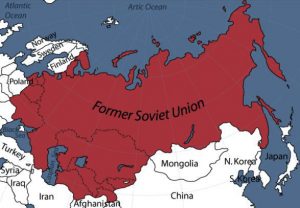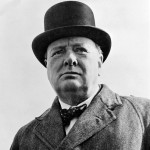reagan doctrine
 After the March 5, 1946, speech by former British Prime Minister Winston Spencer Churchill, condemning the Soviet Union’s policies in Europe, in which he declared, “From Stettin in the Baltic to Trieste in the Adriatic, an iron curtain has descended across the continent.” It was basically the opening remark that defined the Cold War years, and everyone knew that Russia could not be trusted. I suppose that they were similar to the North Koreans today. The Cold War would continue for the next 45 years. It was a source of concern for a number of United States Presidents over the years, as well as the American people. President Ronald Reagan was one of those presidents.
After the March 5, 1946, speech by former British Prime Minister Winston Spencer Churchill, condemning the Soviet Union’s policies in Europe, in which he declared, “From Stettin in the Baltic to Trieste in the Adriatic, an iron curtain has descended across the continent.” It was basically the opening remark that defined the Cold War years, and everyone knew that Russia could not be trusted. I suppose that they were similar to the North Koreans today. The Cold War would continue for the next 45 years. It was a source of concern for a number of United States Presidents over the years, as well as the American people. President Ronald Reagan was one of those presidents.
On March 8, 1983, while speaking at a convention of the National Association of Evangelicals in Florida, President Ronald Reagan publicly referred to the Soviet Union as an evil empire. It was the second time in his career that President Reagan had made this reference. He had first used the phrase in a 1982 speech at the British House of Commons. Some considered Reagan’s use of the Star Wars film-inspired terminology to be brilliant democratic rhetoric, but then in my opinion there was little about President Reagan that wasn’t brilliant. Of course, there were those within the international diplomatic community who denounced it as irresponsible bombast…typical remarks from those who would appease their enemies, thinking that it would stave off any attack. Most evil nations think of appeasement as a show of weakness…and it doesn’t do much for how the citizens of the good nations feel about their own safety either.
President Reagan was prepared to take an aggressive stance toward the Soviet Union. In his plan, known as the  Reagan Doctrine, he warned the nations of the world against what he saw as the dangerous trend of tolerating the Soviets build-up of nuclear weapons and attempts to infiltrate Third World countries in order to spread communism. President Reagan’s policy was basically peace through strength. We had to make the Soviets understand that we would never compromise our principles and standards, nor ignore the facts of history and the aggressive impulses of an evil empire. To do so would mean abandoning the struggle between right and wrong and good and evil, and he knew that must never happen. I think we, the nations of the world, have seen just how detrimental a weak security stance can be given the current mess we are digging out of.
Reagan Doctrine, he warned the nations of the world against what he saw as the dangerous trend of tolerating the Soviets build-up of nuclear weapons and attempts to infiltrate Third World countries in order to spread communism. President Reagan’s policy was basically peace through strength. We had to make the Soviets understand that we would never compromise our principles and standards, nor ignore the facts of history and the aggressive impulses of an evil empire. To do so would mean abandoning the struggle between right and wrong and good and evil, and he knew that must never happen. I think we, the nations of the world, have seen just how detrimental a weak security stance can be given the current mess we are digging out of.
Reagan proposed a policy that went beyond the Truman Doctrine of containment, urging active intervention. His plan was to increase United States military spending and, if necessary, to use force to roll back communist expansion in Third World nations. His administration provided military aid to Nicaraguan groups fighting the leftist Sandinista government and gave material support to the Afghan mujahedeen in their ongoing war against Soviets. At the same time, he reassured Americans that he would pursue an understanding with totalitarian powers and cited the United States’ effort to limit missile development as a step toward peace. Reagan’s doctrine came at the same time as a surge in international and domestic protests against the United States-Soviet arms  race. His opponents blamed the administration for causing the largest increase in American military spending since the beginning of the Cold War, a policy that swelled the nation’s budget deficit. I suppose that those who just look at the money, might think this was a bad thing, but in the late 1980s the Soviet Union collapsed, ending decades of communist rule in Russia and Eastern Europe. There were those who believed that it had collapsed under the weight of its own bloated defense spending and a protracted war in Afghanistan, but Reagan and his supporters credited his hard-line anti-communist policies for defeating Soviet communism. I am inclined to agree with President Reagan, because I have never believed that we can appease our way to peace and safety in this world.
race. His opponents blamed the administration for causing the largest increase in American military spending since the beginning of the Cold War, a policy that swelled the nation’s budget deficit. I suppose that those who just look at the money, might think this was a bad thing, but in the late 1980s the Soviet Union collapsed, ending decades of communist rule in Russia and Eastern Europe. There were those who believed that it had collapsed under the weight of its own bloated defense spending and a protracted war in Afghanistan, but Reagan and his supporters credited his hard-line anti-communist policies for defeating Soviet communism. I am inclined to agree with President Reagan, because I have never believed that we can appease our way to peace and safety in this world.

